- Home
- Josephine Tey
Brat Farrar Page 12
Brat Farrar Read online
Page 12
"What are you riding?" Brat asked, as Simon led Chevron back to his box.
Simon bolted the half-door and turned to face him.
"I thought you might like to have a look round by yourself," he said. And as Brat, surprised by this piece of luck, was momentarily wordless: "Don't let him get lit-up too much, will you, or he'll break out again when he has been dried."
"No, I'll bring him back cool," Brat said; and flung his leg across his first English horse.
He took one of the two whips that Arthur was holding out for his choosing, and turned the horse to the inner end of the yard.
"Where are you going?" Simon asked, as if surprised.
"Up to the down, I think," Brat said, as if Simon's question had applied to his choice of a place to ride in.
If that gate at the north-west corner of the yard didn't still lead to the short-cut to the downs, then Simon would have to tell him. If it still did lead there, Simon would have one more item to worry about.
"You haven't chosen a very good whip for shutting gates with," Simon said smoothly. "Or are you going to jump everything you come to?" You rodeo artist, the tone said.
"I'll shut the gates," Brat said equably.
He began to walk Timber to the corner of the yard.
"He has his tricks, so look out for him," Simon said, as an afterthought.
"I'll look out for him," Brat said, and rode away to the inner gate which Arthur was waiting to open for him.
Arthur grinned at him in a friendly fashion and said admiringly: "He's a fly one, that, sir."
As he turned to his right into the little lane he considered the implication of that very English adjective. It was a long time since he had heard anything called fly. «Fly» was "cute"-in the English sense, not in the American. Fly was something on the side. A fly cup. Something sly with a hint of cleverness in it.
A fly one, Timber was.
The fly one walked composedly up the track between the green banks netted with violets, his ears erect in anticipation of the turf ahead of them. As they came in sight of the gate at the far end he danced a little. "No," said Brat's hands, and he desisted at once. Someone had left the gate open, but since there was a notice saying PLEASE SHUT THE GAT neatly painted in the middle of it, Brat manoeuvred Timber into the appropriate position for closing it. Timber seemed as well acquainted with gates and their uses as a cow pony was with a rope, but never before had Brat had so delicate and so well-oiled a mechanism under him. Timber obeyed the slightest indication of hand or heel with a lack of questioning and a confidence that was new in Brat's experience. Surprised and delighted, Brat experimented with this new adaptability. And Timber, even with the turf in front of him, with the turf practically under his feet, moved sweetly and obediently under his hands.
"You wonder!" said Brat softly.
The ears flicked at him.
"You perishing marvel," he said, and closed his knees as he turned to face the down. Timber broke into a slow canter, headed for the clumps of gorse and juniper bushes that marked the skyline.
So this was what riding a good English horse was like, he thought. This communion, this being one half of a whole. This effortlessness. This magic.
The close, fine turf slipped by under them, and it was odd to see no little spurt of dust coming up as the shoes struck. England, England, England, said the shoes as they struck. A soft drum on the English turf.
I don't care, he thought, I don't care. I'm a criminal, and a heel, but I've got what I wanted, and it's worth it. By God, it's worth it. If I died to-morrow, it's worth it.
They came to the level top of the down and faced the double row of bushes that made a rough natural avenue, about fifty yards wide, along the crest. This was something that Alec Loding had forgotten to tell him about, and something that had not appeared on a map. Even the Ordnance Survey can hardly take note of juniper growths. He pulled up to consider it. But Timber was in no considering mood. Timber knew all about that level stretch of down between the rows of bushes.
"All right," said Brat, "let's see what you can do," and let him go.
Brat had ridden flyers before. Dozens of them. He had ridden sprinters and won money with them. He had been bolted with at the speed of jet propulsion. Mere speed no longer surprised him. What surprised him was the smoothness of the progress. It was like being carried through the air on a horse suspended to a merry-go-round.
The soft air parted round his face and tickled his ears and fled away behind them, smelling of grass with the sun on it and leather and gorse. Who cares, who cares, who cares! said the galloping feet. Who cares, who cares, who cares! said the blood in Brat's veins.
If he died to-morrow it was all the same to him.
As they came to the end of the stretch Timber began to pull up of his own accord, but it was against Brat's instincts to let a horse make the decisions, so he kept him going, turned him round the south end of the green corridor, and cantered him gently to a walk, and Timber responded without question.
"Brother," said Brat, running his fingers up the dark crest, "are there more like you in England, or do you rate special?"
Timber bent his head to the caress, still with the air of one receiving his due.
But as they walked back on the south side of the irregular green hedge Brat's attention and interest went to the countryside spread below them. Except that he was looking at it upside down, as it were-from the north, instead of from the south as one looks normally at a map-this was Clare as he had first become acquainted with it. All laid out below his eye in Ordnance Survey clarity and precision.
Down below him, a little to his left, were the crimson roofs of Latchetts, set in the neat squares of paddock. Farther to the left was the church, on its own small rise; and left of it again, the village of Clare, a huddle of roofs in pale green trees. Where the land sloped up from the village to make the south side of the small valley stood Clare Park, a long white house sheltered from the south-west Channel gales by the slope behind it.
Directly opposite him that slope rose into a smaller and tamer version of the down he was sitting on; a low green hill called Tanbitches. It was an open stretch of grazing, marked half-way up with the green scar of an old quarry, and crowned by the beeches that had given it its name. There were only seven beeches now instead of ten, but the clump made a decorative and satisfying climax to the southern side of the valley.
The other side of the Tanbitches hill, as he knew from the maps, ran away in a gentle slope for a mile and a half to the cliffs. To the cliffs where Patrick Ashby had put an end to his life. Behind the lower rise of the valley, on the reverse slope of Clare Park, were farms that merged imperceptibly in a mile or two into the suburbs of Westover. In the slight hollow that marked the Clare Park slope from Tanbitches hill was a path that led to the coast. The path that Patrick Ashby had taken on that day eight years ago.
It was suddenly more real to him than it had ever been so far: this tragedy which he was using to his advantage. More real even than it had been in the rooms that Patrick had lived in. In the house there had been other associations besides Patrick: associations more present and alive. There had been the distractions of human intercourse and of his own need to be constantly wary. Out here in the open and alone it had a reality that it had never had before. Up that straggling path on the other side of the valley a boy had gone, so loaded with misery that this neat green English world had meant nothing to him. He had had horses like Timber, and friends and family, and a belonging-place, and it had all meant nothing to him.
For the first time in his detached existence Brat was personally aware of another's tragedy. When Loding had first told him the story, in that London pub, he had had nothing but contempt for the boy who had had so much and could not do without that little extra. A poor thing, he had thought. Then Loding had brought those photographs to Kew, and had shown him Patrick, and he had had that odd feeling of identification, of partisanship.
"That is Pat Ashby. He was about
eleven there," Loding had said, his feet propped comfortably on the railings of the park, and had passed him the piece of paper. It was a snapshot taken with a Brownie 2A, and Brat had accepted it with a curiosity that was active but not urgent.
But Pat Ashby had not been the anonymous "poor thing" that he had so far held in his mind. He had been a real person. A likeable real person. A person who would have been, Brat felt, very much his cup of tea. From being vaguely anti-Patrick he had become Patrick's champion.
It was not, however, until this moment of quiet above Latchetts that he had been moved to sorrow for him.
Clink-clink! came the faint sound from the valley; and Brat's eyes travelled down from Tanbitches to the cottage at its foot. The blacksmith's, that was. A quarter of a mile west of the village. A tiny black square by the roadside it had been on the map; now it was a small building with a black chimney and an occupant who made musical sounds with a hammer.
The whole scene was very like the picture from which he had acquired his first-year French. Voila le forgeron. It needed only a cure coming from the church. And a postman on a bicycle between the forge and the village.
Brat slid from Timber's back, from long habit loosened the girths as if he saddled up hours ago, and sat down with his back to the gorse and juniper to feast his eyes on this primer of the English countryside.
15
The great clouds sailed up and past, the sunlight flickered and ran, the uncertain soft wind edged in and out of the junipers and made soft scufflings in the grass. Timber made small sounds with his bit, and cropped turf in a tentative and superior fashion. Brat sank into a daze of pleasure and ceased altogether from conscious thought.
He was roused by the swift fling-up of Timber's head, and almost at the same moment a female voice behind him said, as if it were a chant and rhymed:
"Don't look,
Don't move,
Shut your eyes
And guess who."
It was a slightly Cockney voice, and it dripped with archness.
Like anyone else in the circumstances Brat disobeyed the injunction automatically. He looked round into the face of a girl of sixteen or so. She was a large, plumpish girl, with bright auburn hair and prominent blue eyes. The eyes were remarkable in that they managed to be at once avid and sleepy. As they met Brat's they almost popped out altogether.
"Oh!" said the girl, in a half-shriek. "I thought you were Simon. You're not!"
"No," agreed Brat, beginning to get to his feet.
But before he could move she had dropped to the grass beside him.
"My, you gave me a shock. I bet I know who you are. You're the long-lost brother, aren't you? You must be; you're so like Simon. That's who you are, isn't it?"
Brat said that it was.
"You even wear the same kind of clothes."
Brat said that they were Simon's clothes. "You know Simon?"
"Of course I know Simon. I'm Sheila Parslow. I'm a boarder at Clare Park."
"Oh." The school for dodgers, Eleanor had called it. The place where no one had to learn the nine-times.
"I'm doing my best to have an affaire with Simon, but it's uphill work."
Brat did not know the correct rejoinder to this, but she did not need conversational encouragement.
"I have to do something to put some pep into life at Clare Park. You can't imagine the screaming boredom of it. You simply can't imagine. There is nothing, but I mean nothing, that you are forbidden to do. I once got so desperate I took off all my clothes and walked into Cedric's office-Cedric is our Leader, he doesn't like being called the Head, but that's what he is, of course-I walked in with nothing on, not a stitch, and all he said was: 'Have you ever thought of going on a diet, Sheila dear? Just took a look at me and said: 'Have you ever thought of going on a diet? and then went on with looking up Who's Who. He's always looking up Who's Who. You don't really stand much of a chance of fetching up at Clare Park unless your father is in Who's Who. Or your mother, of course. My father's not in it, but he has millions, my father, and that makes a very good substitute. Millions are a very good introduction, aren't they?"
Brat said that he supposed they were.
"I flapped Father's millions in front of Simon; Simon has a great respect for a good investment and I hoped it would weight my charms, so to speak; but he's a frightful snob, Simon, isn't he?"
"Is he?"
"Don't you know?"
"I've only met him to-day."
"Oh, of course. You've just come back. How exciting for you. I can understand Simon not being overjoyed, of course, but it must be exciting for you to put his nose out of joint."
Brat wondered if she, too, pulled the wings off flies.
"I may have more chance with Simon now that you've taken his fortune from him. I'll have to waylay him somewhere and see. I thought I was waylaying him now, when I saw Timber. He often comes up here because it's his favourite place for exercising the horses. He hates Tanbitches." She jerked her chin at the opposite side of the valley. "And this is a good place for getting him alone. So I came up here on spec, and then I saw that black brute, and I thought I had him cold. But it was only you."
"I'm sorry," Brat said meekly.
She considered him.
"I suppose it's no good my trying to seduce you instead?" she said.
"I'm afraid not."
"Is it that I'm not your type, or is it not your line?"
"Not much in my line, I'm afraid."
"No, I suppose not," she said, agreeing with him. "You have a face like a monk. Funny you should look so like Simon and yet look so different. Simon's no monk; as that Gates girl over at Wigsell could tell you. I make images of that Gates girl and stick pins in them, but it doesn't do any good. She goes on blooming like a blasted peony and fascinating him like fly-paper."
She was rather like a well-blown peony herself, he thought, looking at her wet red mouth and the buttons straining the cloth across her ample bust. A rather drooping and disappointed peony at the moment.
"Does Simon know that you are fond of him?" Brat asked.
"Fond of him? I'm not fond of him. I don't think I like him at all. I just want to have an affaire with him to brighten up the term a bit. Until I can leave this boring place."
"If you can do anything you like, why can't you leave now?" Brat asked reasonably.
"Well, I don't want to look too much of a fool, you know. I went to school at Ling Abbey, you see, and I made the place a hell so that my people would take me away and send me here. I thought I was going to have the time of my life here, with no lessons and no timetable and no rules or anything. I had no idea it would be so boring. I could weep with boredom."
"Isn't there anyone at Clare Park you could substitute for Simon? I mean, someone who would be more-accommodating?"
"No, I had a look at them first. Skinny and hairy and intellectual. Have you ever noticed how the intellect runs to hair? Some people get a kick out of disgust, but not me. I like them good-looking. And you have to admit Simon is very good-looking. There was an under-gardener at Ling Abbey that was almost as handsome, but he hadn't that lovely God-damn-you look that Simon has."
"Didn't the under-gardener keep you at the Abbey place?"
"Oh, no, they sacked him. It was easier than expelling me and having a scandal. But they had to expel me in any case, so they might as well have kept poor Albert. He was much better with his lobelias than he was with girls. But of course they couldn't be expected to know that. I suppose you wouldn't put in a good word for me with Simon? It would be such a pity to waste all the agony I've gone through trying to interest him."
"Agony?"
"You don't suppose I endure hours on those horrible quadrupeds just for fun, do you? With that cold stick of a sister of his looking down her nose at me. Oh, I forgot: she's your sister too, isn't she? But perhaps you've been away so long that you don't think of her the way a boy thinks of his sister."
"I certainly don't," Brat said; but she was not l
istening.
"I suppose you've ridden horses since you could crawl, so you have no idea what it is like to be bumped about on a great shapeless mountain of a thing that's far too high from the ground and has nothing to hold on to. It looks so easy when Simon does it. The horse looks so nice and narrow when you're standing on the ground. You think you could ride it the way you ride a bicycle. It's only when you get up you find that its back is simply acres across and you can make no impression on it at all. You just sit there and are bumped about, and your legs slip backwards and forwards instead of staying still like Simon's, and you get large blisters and can't sit down in the bath for weeks. You don't look quite so like a monk when you smile a bit."
Brat suggested that surely there were better ways of attracting favourable notice than being a tyro at something that the object of one's pursuit already did to perfection.
"Oh, I didn't think that I'd attract him that way. It just gave me an excuse for being round the stables. That sister of-your sister doesn't stand any hanging round if you haven't got business."
"Your sister," he thought, and liked the sound of it.
He had three sisters now, and at least two of them were the kind he would have indented for. Presently he must go down and make their further acquaintance.
"I'm afraid I must go," he said, getting up and putting the reins over Timber's head.
"I wish you didn't have to," she said, watching him tighten the girth. "You are quite the nicest person I have talked to since I came to Clare. It's a pity you aren't interested in women. You might cut Simon out with the Gates girl, and then I'd have more chance. Do you know the Gates girl?"
"No," Brat said, getting up on Timber.
"Well, have a look at her. She's very pretty."
"I'll do that," Brat said.
"Now that you're home, I'll be running across you in the stables, I suppose."
"I expect so."
"You wouldn't like to give me one of my lessons instead of your sister, would you?"

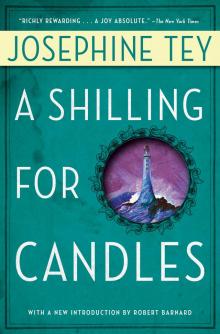 A Shilling for Candles
A Shilling for Candles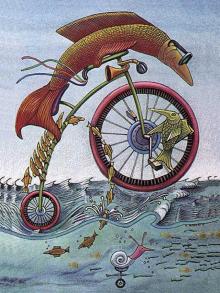 The Singing Sands
The Singing Sands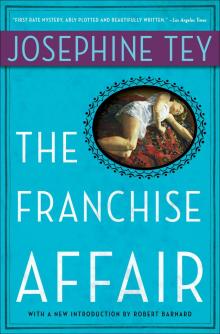 The Franchise Affair
The Franchise Affair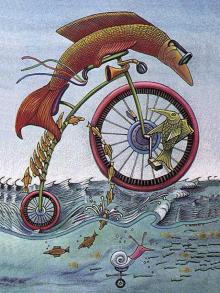 Daughter of Time
Daughter of Time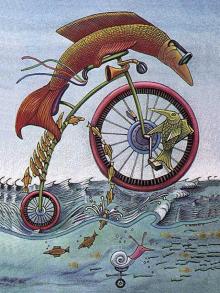 To Love and Be Wise
To Love and Be Wise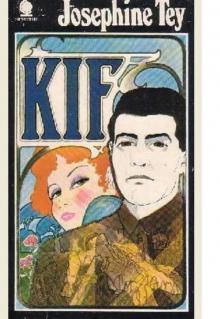 Kif
Kif The Expensive Halo: A Fable Without Moral
The Expensive Halo: A Fable Without Moral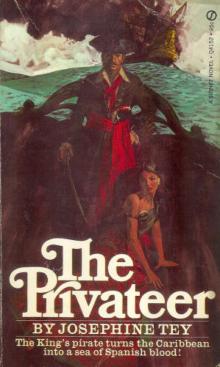 The Privateer
The Privateer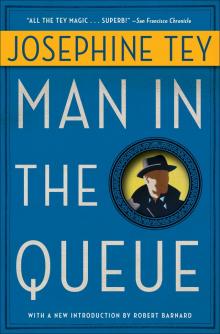 The Man in the Queue
The Man in the Queue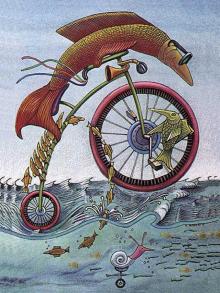 Miss Pym Disposes
Miss Pym Disposes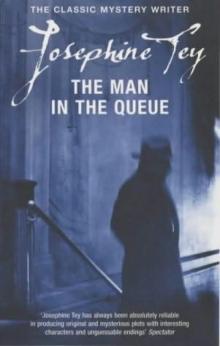 The Man in the Queue ag-1
The Man in the Queue ag-1 Brat Farrar
Brat Farrar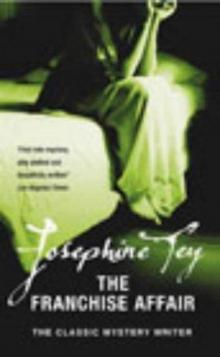 The Franchise Affair ag-3
The Franchise Affair ag-3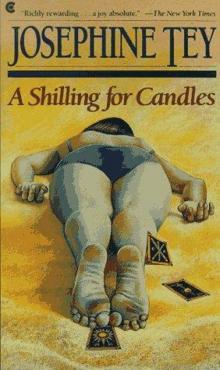 A Shilling for Candles ag-2
A Shilling for Candles ag-2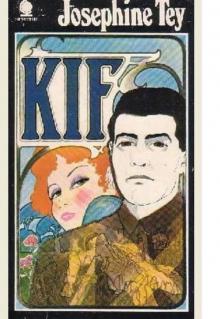 Kif: An Unvarnished History
Kif: An Unvarnished History The Expensive Halo
The Expensive Halo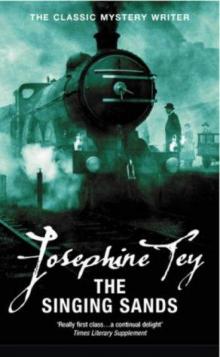 The Singing Sands ag-6
The Singing Sands ag-6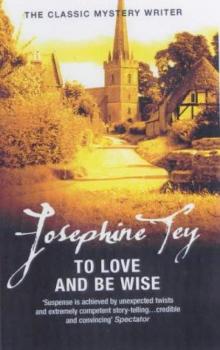 To Love and Be Wise ag-4
To Love and Be Wise ag-4